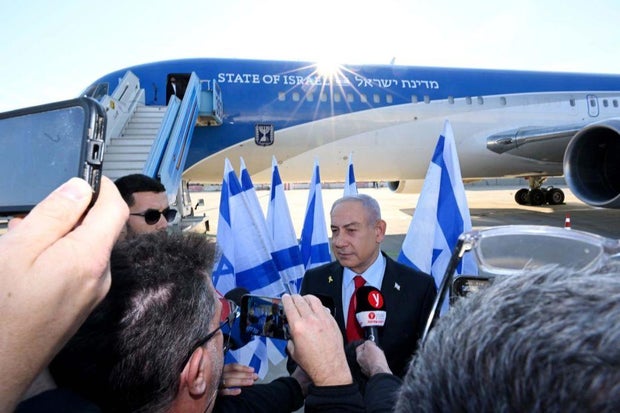Israeli Prime Minister Benjamin Netanyahu is on his way to the United States for a pivotal meeting with President Trump during which they are expected to discuss “victory over Hamas” and expanding diplomatic relations with Arab countries.
The meeting Tuesday at the White House will be Mr. Trump’s first with a foreign leader since returning to office on Jan. 20. It comes as the fragile truce between Israel and Hamas in Gaza holds and mediators begin the daunting work of brokering the next phase of the agreement.
Hamas, which has quickly reasserted its control over Gaza since the ceasefire took hold last month, is expected to free a total of 33 Israeli hostages during the first, six-week phase of the ceasefire and hostage release deal, which took effect on Jan. 19. After the release on Saturday, 18 have been freed so far.
The militant group has said it will not release the hostages slated to go free in the second phase without an end to the war and the full withdrawal of Israeli forces.
In a statement released ahead of his departure on Sunday, Netanyahu said he and Mr. Trump would discuss “victory over Hamas, achieving the release of all our hostages and dealing with the Iranian terror axis in all its components,” referring to Iran’s alliance of militant groups across the region, including Hamas.
Avi Ohayon (GPO) / Handout/Anadolu via Getty Images
He said that that by working together, they could “strengthen security, broaden the circle of peace and achieve a remarkable era of peace through strength.”
Netanyahu also said it was “telling” that he was the first foreign leader to be meeting with Trump since his return to the White House.
“I think it’s a testimony to the strength of the Israeli-American alliance,” he said.
Netanyahu is under mounting pressure from far-right governing partners to resume the war after the first phase ends in early March. He has said Israel is still committed to victory over Hamas and the return of all the hostages captured in the militants’ Oct. 7, 2023, attack that triggered the war.
It’s unclear where Trump stands.
He has been a staunch supporter of Israel but has also pledged to end wars in the Middle East and took credit for helping to broker the ceasefire agreement.
The deal has halted the fighting and led to the release of 18 hostages who had been held for over 15 months, as well as hundreds of Palestinians imprisoned by Israel.
An Israeli airstrike on a vehicle in central Gaza wounded five people on Sunday, including a child who was in critical condition, according to Al-Awda Hospital, which received the casualties. The Israeli military said it fired upon the vehicle because it was bypassing a checkpoint while heading north in violation of the ceasefire agreement. The military said it remains committed to the deal.
The war began when thousands of Hamas-led militants stormed into southern Israel on Oct. 7, 2023, killing some 1,200 people, mostly civilians, and taking around 250 hostages. Over 100 hostages were freed during a weeklong ceasefire in November 2023, eight have been rescued alive and dozens of bodies have been recovered by Israeli forces.
Israel’s air and ground war has killed over 47,000 Palestinians, more than half of them women and children, according to Hamas-run health authorities who do not say how many of the dead were fighters.
Negotiations on the second phase, in which the war would end and the remaining 60 or so hostages would be returned, are set to begin Monday. If the United States, Qatar and Egypt are unable to broker an agreement between Israel and Hamas, the war could resume in early March.
Aspirations for a bigger deal
Trump’s Mideast envoy, Steve Witkoff, joined the yearlong ceasefire negotiations in their final weeks last month and helped push the agreement over the finish line. He met with Netanyahu in Israel last week and the two were expected to formally begin talks on the second phase in Washington on Monday.
Trump, who brokered normalization agreements between Israel and four Arab countries in his first term, is believed to be seeking a wider and potentially historic agreement in which Israel would forge ties with Saudi Arabia.
But the kingdom, which resisted similar entreaties from the Biden administration, has said it would only agree to such a deal if the war ends and there is a credible pathway to a Palestinian state in Gaza, the West Bank and east Jerusalem, territories Israel captured in the 1967 Mideast war.
Netanyahu’s government is opposed to Palestinian statehood, and a key partner, far-right Finance Minister Bezalel Smotrich, has threatened to leave the governing coalition if the war is not resumed next month. That would raise the likelihood of early elections in which Netanyahu could be voted out.

